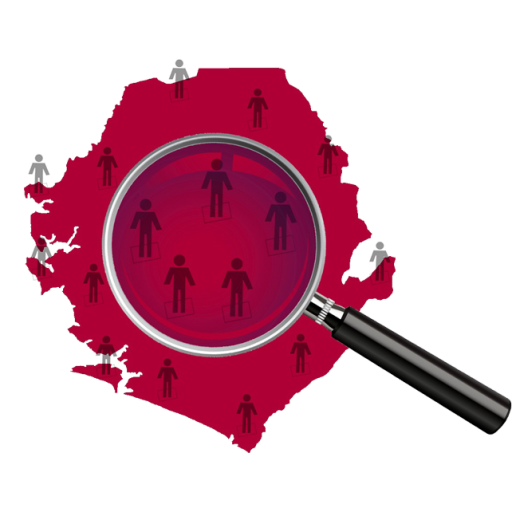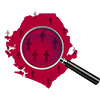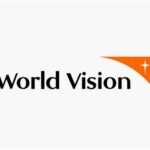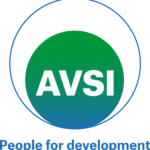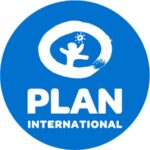Call for Expression of Interest for Sub-Recipients to implement Global Fund Grant Cycle Seven (GC-7) under HIV, TB and Malaria
by World Vision
Job Overview
-
Date PostedMarch 13, 2024
-
Location
-
Expiration dateMarch 26, 2024
-
Experience3 Years
-
GenderBoth
-
QualificationBachelor Degree
-
OrganizationWorld Vision
-
Required LanguagesEnglish
Job Description
| Call for Expression of Interest for Sub-Recipients (SRs) to implement Global Fund Grant Cycle Seven (GC-7) under HIV, TB and Malaria |
- Background
World Vision is a Christian humanitarian aid, development, and advocacy organization dedicated to working with children, families, and their communities to reach their full potential by tackling the causes of poverty and injustice. World Vision International Sierra Leone (WVISL) has been selected as the Civil Society Organization (CSO) Co-Principal Recipient (PR2) for the Global Fund Grant Cycle 7 (GC-7) program in Sierra Leone that will run from 1st July 2024 to 30th June 2027.
In the GC-7 implementation period, WVISL was selected as the Co-Principal Recipient to implement comprehensive HIV, Malaria, and TB prevention programming and to strengthen the Resilient and Sustainable Systems for Health (RSSH). WVISL will implement the following comprehensive HIV, Malaria, and TB prevention programming:
- Among Key Affected Populations (Sex Workers and their clients, Men who have Sex with Men (MSM) and their clients, Transgender individuals (TG), and People Who Inject Drugs (PWID) to ensure access to timely, uninterrupted treatment and devoid of discrimination and stigma.
- Among Adolescent Girls and Young Women (AGYW) and their male sexual partners. • Enhance strong community-led monitoring (CLM) to inform advocacy and access to services. • Ensure consistent use of Long-Lasting Treated Mosquito Nets by pregnant women, children under five years, and the entire population.
- Create demand for HIV, Malaria, and TB services at the community level
- Address structural barriers and human rights that impact access to services.
- Support policy formulation and advocacy for HIV, Malaria, and TB interventions whilst also informing strong Standard Operating Procedures (SOPs) and guidelines.
- Enhance Community System Strengthening (CSS) for the three diseases.
- Support Social and Behavioral Change (SBC) for the three diseases that impact access to services and address stigma and discrimination.
WVISL is therefore seeking potential partners within the Civil Society Organizations (CSOs) community as Sub Recipients (SRs) for the above-named intervention areas. Eligible and interested CSOs are invited to submit their expressions of interest, highlighting their area(s) of interest, relevant capacities, expertise, skills, and ability to support the achievement of results in the fight against HIV and Malaria, and Community System Strengthening in the following districts:
| Disease Area | Districts | SRs Required |
| HIV | Western Area Rural, Bombali and Kono | One SR required |
| HIV | Moyamba, Bo and Kailahun | One SR required |
| Malaria | Kenema, Tonkolili, Kambia, and Western Area Urban | One SR required |
- HIV Sub Recipients Scope of Work and Geographical Coverage
The HIV epidemic in Sierra Leone is considered mixed, generalized, and heterogeneous but concentrated in key Population groups (KP). The HIV epidemic affects the KP groups through multiple and diverse transmission dynamics. Although the prevalence of HIV among the general population appears low in Sierra Leone at 1.7% (SLDHS 2019), key population groups have a significantly higher HIV prevalence compared to the National figure of 1.7% (IBBSS 2021). HIV prevalence among these populations is FSW-11.8%, Transgender-4.2%, PWID-4.2%, and MSM3.2%. (NSP_NACP). In addition, Adolescent Girls and Young Women, clients of FSW (such as fisher folks, miners, and transporters), and partners of Recipients of Care (RoC) have been identified as vulnerable and at risk of HIV infection. Differential vulnerability levels, social risk factors, high-risk sexual practices, and limited access to appropriate HIV interventions influence HIV incidence among these populations.
WVISL plans to partner with two competent and experienced SRs to support the implementation of HIV-related activities enhancing the minimum package of prevention interventions, supporting Community Systems Strengthening (CSS), and promoting social behavioural change interventions for the uptake of HIV services and addressing structural barriers that impede the uptake of HIV services while strengthening Human Rights activities for KPs.
Comprehensive Prevention Programs for KPs :
SR will support equitable HIV interventions for key populations through differentiated prevention, testing, care, and treatment services, integrating services (including mental health, STI, TB, and other services) and addressing barriers to accessing services. The SR will engage with hard-to-reach populations and provide client-centred services through KP community-led programming. WVISL plans to implement a comprehensive prevention package through:
- Condom and lubricant programming
- Harm reduction interventions
- Behavioral Change interventions
- HIV testing services
- HIV treatment and care + pre-exposure prophylaxis (PrEP)
- Prevention and management of viral Hep, TB, and mental health conditions
- Sexual and reproductive health interventions and Mother to Child Transmission
Differentiated HIV Testing Services for KPs and AGYWs:
Adolescent girls and young women (AGYW) remain at a disproportionately substantial risk of HIV infection. AGYW routinely faces the threat of physical violence, early marriage, unwanted pregnancy, interrupted schooling, limited access to healthcare services, and unpaid, unsafe employment opportunities. These factors have put AGYW at a substantially higher risk of contracting HIV than their male peers. The selected SR will ensure that services at the Dropin Centers (DICs) are optimized through the engagement of peer educators and navigators, including qualified nurses to deploy social network testing approaches to expand the testing net for KPs at the DICs in collaboration with NACP. Strengthen the social network on testing to increase testing to reach more KPs, promote community ART initiation to improve ART linkage among KP who are ready to receive treatment at the time of diagnosis, and support community testing to reach more KPs who are at risk of HIV acquisition and transmission. The overall goals of the HIV Services for KP intervention are (a) To reduce new HIV infections among KPs and (b) To reduce HIV-related morbidity and mortality among KPs. Specifically, the SR will support
- Facility-based testing for key population (KP) programs, ensuring services at the DICs are optimized through the engagement of peer educators, peer navigators, and qualified nurses to deploy social network testing approaches to expand the testing net for KPs in collaboration with NACP.
- Multiple activities for community-based testing for KPs, in collaboration with NACP, to promote community ART initiation to improve ART linkage among KP who are ready to receive treatment at the time of diagnosis.
- Self-testing for KP programs dependent on the availability of commodities, to promote differentiated testing in social networks and index testing to expand access to key populations and their partners yet to know their HIV status.
- Intensify HIV Case Detection which will allow the use of different products and different implementation models. including integration of HIV/syphilis testing services, community-based testing (by CHWs and KPs) and EID, and innovative approaches like ‘Moonlight’ to create demand among FSW KP members to attend targeted mobile HIV testing services.
In addition, the SR will also support specific AGYW-related services, which are to
- Scale up prevention of gender-based and intimate-partner violence among FSWs through Peer led education.
- Prevent and reduce women and girls’ vulnerability to sexual violence and other harmful cultural practices, by engaging with traditional, religious and opinions leaders and national campaigns on SGBV.
- Strengthen HIV self-testing and assisted partner notification to KP and priority population groups in high burden districts.
- Enhance community-based testing for AGYW and their male sexual partner’s programs to reach adolescents at risk of HIV acquisition and transmission. Support the integration of existing standalone adolescent structures to increase access to testing, including index testing services to reach sexual partners of adolescents yet to know their status and offer tailored testing outcomes.
Key Affected Populations Program :
Key Populations (KP) in Sierra Leone face a disproportionate HIV and STI burden, driven by structural barriers such as stigma, discrimination, violence, human rights violations, and limited access to KP-friendly services (Global HIV Prevention Score Card, 2022). HIV infections remain much higher in Female Sex Workers (FSW), Men who have Sex with Men (MSM), Transgender (TG), and People Who Inject Drugs (PWID) than in the general population. Despite the high levels of HIV prevalence among these sub-populations, the coverage of appropriate HIV prevention, care, and treatment programs for these KPs remains sub-optimal. Like other countries in Sub-Saharan Africa, in Sierra Leone, access to HIV prevention, treatment, and care continuum remains a challenge for many KP due to stigma, violence linked to their identity, sexual orientation, and laws that criminalize same-sex relationships.
WVISL plans to implement KP programming through Sub-Recipients (SRs) in the 6 high burden districts of Western Area Urban, Bombali, Kono, Moyamba, Bo, and Kailahun. The selected SRs will provide the following interventions to KPs (MSM, PWID, FSW, and TG) and their sexual partners (defined program core package) to reduce the risk of HIV transmission:
- Provision of free HIV counselling and testing, IEC materials, and referral for STIs, antiretroviral including STIs, hepatitis B and C, post-violence care and screening for Tuberculosis.
- Condom and Lubricant programming to ensure access to and consistent use of condoms and lubricants in the six intervention districts.
- Provide comprehensive outreach sexual and reproductive health services, including testing and treatment for STIs, Hepatitis, and post-violence care. Targeted demand creation using social media, chat rooms, mass media and IEC material and tailored interventions to reach young KPs.
- Ensuring KP interventions take place in leisure places which are frequent sites for key populations and their customers, as well as adapted service centres and/or community centres to receive HIV/STI testing services and advice on prevention, treatment, care and support in DIC.
- Carry out behavioral Interventions that will provide information, motivation, education, and skills-building to help the KPs reduce risky behaviours and sustain positive change. In
addition, HIV prevention communication, information, and demand creation for the four Key population groups (MSM, FSW, PWID and TG) and their partners.
- Carry out community empowerment that will seek to increase access to HIV prevention, treatment and SRHR services for KPs and other high-risk sub-population groups by organizing refresher training for existing peer educators/navigators to implement HIV prevention services.
- Providing Prevention Packages for People Who Inject Drugs (PWIDs) and their Sexual Partners inclusive of needle and syringe services, management of Opioid overdose (facility and community-based) and opioid substitution therapy. In addition, providing services on harm reduction services and harm reduction interventions for drug use.
- Support in Establishing 2 to 5 DICs in the districts of Kailahun and Kono, after an assessment of this approach.
- Support programming on addressing TB co-infection rate among PLHIV, and build the capacity of the KP service providers to conduct screening for TB among KPs in the community and on TPT services in the DICs.
- Provide support to ongoing School Health Clubs (SHCs) in the districts by introducing TB and HIV/AIDS messages to allow the revision of messages/spots/IEC materials on Malaria, TB and HIV/AIDS including the signing of MoU with different community radios for local dialects diffusion.
- Carry out In Interactive Radio Programming which serves as one of the main channels of information for communities on HIV issues.
- Carry out biomedical interventions to directly influence the biological systems by blocking viral transmission, decreasing infectivity, and reducing the risk of acquiring the infection such as the design and implementation of an oral PrEP program, including determining eligibility, site planning and service delivery models.
- Provide adherence support including peer-led adherence support, peer-led PrEP literacy and awareness, development, and distribution of PrEP-specific IEC materials. And supporting referrals to HIV/STI prevention, testing, treatment, care and clinical monitoring, hepatitis B vaccination, and other primary health care (PHC) services.
Malaria SR Scope of Work and Geographical Coverage
Sierra Leone’s entire population is at risk of Malaria. In Sierra Leone, Malaria is endemic with stable and perennial transmission in every part of the country. The whole population is at risk of malaria, but pregnant women and children under five years are most vulnerable. The Malaria burden has markedly decreased between 2016 and 2019, with a reduction in Malaria incidence from 316 to 271 per 1,000 Population. Malaria is still the leading cause of morbidity and mortality amongst children under five years of age and remains a serious public health challenge and driver of poverty. The disease accounts for 40.3% of outpatient morbidity for all ages and 47% of outpatient morbidity for under-five children. Malaria is also responsible for 37.6% of hospitalized cases with a
case Fatality Rate (CFR) of 17.6%. In Sierra Leone, the disease accounted for an estimated 2.4 million confirmed cases and 6,500 deaths in 2018 (National Malaria Strategic Plan 2016–20). In 2019, there was an increase in suspected malaria cases, which can be attributed to increased reporting from private sector facilities and improved access to diagnosis and treatment provided by community health workers, especially in hard-to-reach areas (Malaria Indicator Survey 2021). WVISL will implement malaria intervention through one SR in the 4 high burden districts of Kenema, Tonkolili, Kambia, and Western Area Urban. The selected SR will implement the following interventions (defined program core package). These are
- Interventions on IEC/ACSM/SBCC.
- Advocacy, communication and social mobilization (ACSM) activities related to equitable access to specific malaria prevention interventions and all other services including case management, LLIN use, timely treatment-seeking and testing before treatment according to national policies and guidelines.
- Strengthen the school health program for malaria prevention and control: Using a renewed School Health Club (SHC) approach, participating school children will be encouraged to share malaria, TB and HIV/AIDS prevention and control knowledge and skills with their respective households.
- In addition, the integration of Malaria, TB, HIV and AIDS will be done by expanding the Community Action Against Malaria; TB and HIV/AIDS (CAAM) approach to include TB and HIV.
- Ensuring consistent use of Long-Lasting Treated Mosquito Nets by pregnant women, children under five years and the entire population.
- Ensuring that pregnant women take 3 or more doses of SP during each pregnancy. • Ensuring that all fever cases are tested for malaria before malaria treatment is given. • Ensuring that caregivers of children under five years and pregnant women with fever seek treatment within 24 hours
- Ensuring that caregivers of children less than one year ensure that the child receives 3 or more doses of SP during the first year of life.
- Intensifying social behaviour change (SBC) interventions that impact positively on all services provided to beneficiaries in the fight against malaria to achieve elimination in the country.
Selection Process for Sub Recipients (SRs) :
A clear, transparent, and documented process for selecting the successful sub-recipients will be undertaken. This process will include the evaluation and assessment of EOIs by a multi-stakeholder review panel which will include the CCM, Government and civil society stakeholders.
Application Eligibility Criteria :
To be considered for award as a Sub-Recipient, the shortlisted Civil Society Organization must: • Be a national or international institution that is registered and currently operating in Sierra Leone.
- Be compliant with local laws and have the license to operate under the relevant laws of Sierra Leone.
- Submit a complete application by the due date, including a fully completed cover page;
- Submit documented evidence of experience working on the relevant program being applied for.
Application and Submission Information :
Each applicant must provide the information required by this call for Expression of Interest. This subsection addresses general content requirements applying to the full application. Please pay attention to the information on the content specific to the expression of interest application.
The expression of interest must include a cover page containing the following information:
- Name of the organization(s) applying;
- Identification and signature of the primary contact person (by name, title, organization, mailing address, telephone number, and email address) and the identification of the alternate contact person (by name, title, organization, mailing address, telephone number, and email address);
- Disease component and districts being applied for.
The EOI should be specific, complete, and presented concisely. The application must demonstrate the applicant’s capabilities and expertise concerning this program.
- Minimum documentation requirements to be submitted (as annexes)
- Copy of registration Certificate (MoPED and SLANGO).
- Certified copy of Annual (not Transactional) Tax Clearance Certificate for 2023 or 2022 Tax Clearance Certificate.
- Certified Audited Financial statements signed by its Executive Director (or the Board) for the last three consecutive years (2020, 2021, and 2022). Please note that applicants can submit either a complete set of Organizational Annual Audited Financial Statements or Project Specific Audit reports.
- Copy of Audit Management Letters for three consecutive years (2020, 2021, and 2022). • Copy of the current Approved Organization’s Strategic plan that has the interventions concerning the module being applied for.
- Copy of project report demonstrating the implementation of this kind of interventions.
- Current Organigramme of the Organization
- List of Senior Management’s full names and positions held in the organization
- List of Board members’ full names.
- Physical addresses of the Head Office and the sub-offices (at regional and/or district levels) of the Organizations in Sierra Leone
Guidelines for submission of applications:
Applicants MUST submit the full application package, including the EOI (Not more than 20 pages, Lato font size 11) and all the supporting documentation in both hard (two copies) and electronic copies (in PDF format):
- Hard and electronic copies must be addressed to ‘World Vision International Sierra Leone Global Fund GC-7 PR2 Technical Review Panel’.
- Electronic copies in PDF format should be sent to
worldvisionSierraLeoneGFselection@wvi.org.
- Applications (including those sent through Courier Services) must be submitted on or before 17:00 GMT, 28th March 2024.
The EOI Application is prepared by the prospective organization, and all the correspondence and documents related to the EOI application shall be submitted in English. Applicants should submit their hard copies and supporting documentation in a sealed envelope addressed to: World Vision International Sierra Leone, 35 Wilkinson Road, PMB 59,
Freetown.
Please note: Applications in response to this EOI must be submitted no later than the closing date and time indicated in this EOI. Late applications will not be reviewed nor considered.
Description of Required Sections.
Detailed descriptions of each required section of the EOI application are as follows and the submitted EOIs must address the following:
Demonstrate strong geographical presence and technical approach to programming:
• The organization should highlight a strong geographical presence and operations related to the disease area being applied for with at least three years of minimum experience implementing said programme within the country.
- Demonstrate the organization’s technical capacity to support the implementation of the selected interventions applied for (HIV or Malaria)
- Describe the technical approach to implementing the selected activities including a strong strategy for ensuring regular data collection and review to inform programming and course corrections in real-time, with attention to poor performance, is essential.
- Demonstrate knowledge and experience in condom and lubricant programming and the last mile distribution innovative approaches.
- Demonstrate the acceptance within the local communities where the intervention is proposed, or a plan to ensure the organization will obtain local leaders and community support.
- Builds on, complements, and co-ordinates with existing national programs, in support of national policies, priorities, strategies, and partnerships and should also have an adequate physical presence in proposed locations for this action, minimum logistical arrangements, etc.
- Demonstrable effective internal control system to prevent and detect misuse or fraud
- The organization should highlight the existence of internal control systems that ensure that it adheres to policies and procedures consistently (including procurement processes). The internal control system should support compliance effectively with donor regulations, especially the Global Fund. Evidence of the operation of the internal control system should be verifiable.
- The applicants should show that selection of and assignment of duties to external auditors and other third-party assurance providers per donor/own prescribed guidelines.
- Clearly defined Risk management framework and mitigation measures in place to manage and mitigate against fraud.
Effective and accurate financial management system :
- Applicants must clearly describe the accounting system in place that can correctly and promptly record all transactions and balances, making clear reference to the budget and work plan of the grant agreement.
- Applicants should show potential to manage all transactions and transfers in a supplier’s transparent manner to safeguard financial and physical assets. The organization should be able to monitor actual spending in comparison to budgets and work plans and investigate variances to take prompt action.
- Applicants should demonstrate strong financial Controls and Systems in place to support the judicious management of Global Fund financial resources, including finance policies, procedures, manual or guidelines.
- Applicants should demonstrate integral systems that contribute to incredible value in reducing fraud and error and promoting operational effectiveness, giving confidence to the donors for transparency and integrity of our internal processes and financial management systems.
- Demonstrate an effective and efficient administrative and financial management structure and practices for the overall implementation of the GF grant.
- Show potential to manage all transactions and transfers to suppliers/ beneficiaries transparently to safeguard financial and physical assets.
Institutional Capability and Past Performance :
- Applicants must summarize their institutional capabilities and technical strengths, including unique or specialty areas of technical expertise.
- The application must include information on experience demonstrating evidence of relevant technical and managerial expertise to implement this project. Applicants should include information demonstrating their ability to work with key stakeholders and their track record of influencing the human rights agenda for adolescent girls and young women and their male partners and marginalized sub-populations in Sierra Leone.
10
- Track record of working with and/or willingness to work with Community-based Organizations (CBO) and Community-led Organizations (CLO) either through provision of support and oversight or payment by result.
- The application should include an Annex listing of all relevant contracts, grants, or cooperative agreements involving similar or related programs during the past five years. The reference information for these awards shall include the project location, award number (if available), a brief description of the work performed, and a point of contact with current telephone numbers and email addresses.
Data-collection capacity and tools to monitor program performance:
- The applicants should describe their monitoring and evaluation (M&E) system that defines relevant indicators for routine monitoring of activities/interventions that are aligned with the goals and objectives of the program in question.
- Demonstrate adequate mechanisms and tools must be in place to report accurate and quality-assessed data from the sub-sub recipient/sub-recipient to the PR level. • Demonstrate the existence of a monitoring and evaluation (M&E) system in place that defines relevant indicators for routine monitoring of activities/interventions that are aligned with the goals and objectives of the program in question.
- Ensure adequate mechanisms and tools are in place to report accurate and qualityassessed data at different levels.
- Demonstrate a strong information system and capacity to collect and provide programmatic reports for the proposed activities, including reports to the PR.
Demonstrate Management Capacity :
- Demonstrate adequate skills (personnel) and systems to gather and process data and relay the same to the PR and other stakeholders.
- The organization should show organizational leadership, with a transparent decision-making process.
SRs Assessment and Recommendation :
WVISL in consultation and collaboration with the GF-CT, CCM SL and Local Fund Agent (LFA) will conduct a robust, inclusive, transparent, and accountable capacity assessment of nominated SRs by the selection committee. This will help WVISL understand organizational capacity, gaps, and risks and plan for capacity-building initiatives for the selected SRs.
NB: A Partner Virtual Information Sharing Session will be held on the 21st of March 2024 at 14:00 GMT. To register for this session, kindly send an email to
worldvisionSierraLeoneGFselection@wvi.org, and a meeting link will be shared with you upon registration. To manage the number of participants, only two people will be allowed
to register per organization. Any request for clarification should be sent to worldvisionSierraLeoneGFselection@wvi.org before close of business on 19th March 2024.
